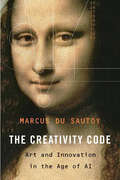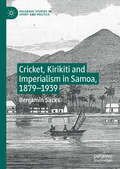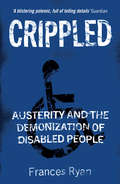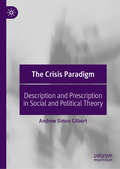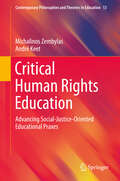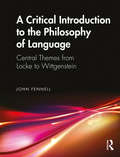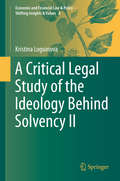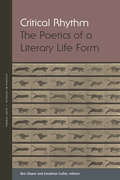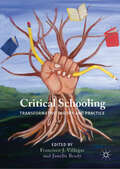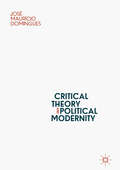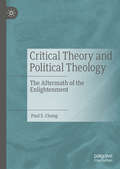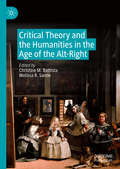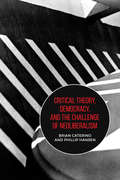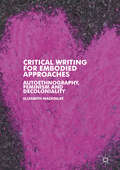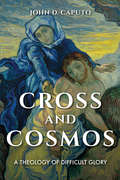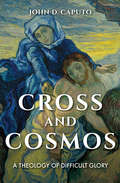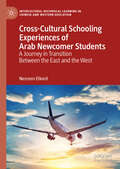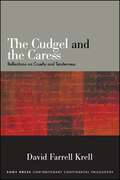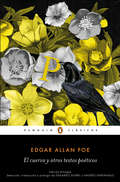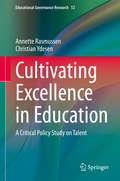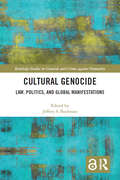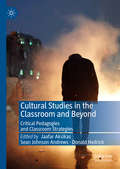- Table View
- List View
The Creativity Code: Art and Innovation in the Age of AI
by Marcus du SautoyMost books on AI focus on the future of work. But now that algorithms can learn and adapt, does the future of creativity also belong to well-programmed machines? To answer this question, Marcus du Sautoy takes us to the forefront of creative new technologies and offers a more positive and unexpected vision of our future cohabitation with machines.
Creatures of Cain: The Hunt for Human Nature in Cold War America
by Erika Lorraine MilamAfter World War II, the question of how to define a universal human nature took on new urgency. Creatures of Cain charts the rise and precipitous fall in Cold War America of a theory that attributed man’s evolutionary success to his unique capacity for murder.Drawing on a wealth of archival materials and in-depth interviews, Erika Lorraine Milam reveals how the scientists who advanced this “killer ape” theory capitalized on an expanding postwar market in intellectual paperbacks and widespread faith in the power of science to solve humanity’s problems, even to answer the most fundamental questions of human identity. The killer ape theory spread quickly from colloquial science publications to late-night television, classrooms, political debates, and Hollywood films. Behind the scenes, however, scientists were sharply divided, their disagreements centering squarely on questions of race and gender. Then, in the 1970s, the theory unraveled altogether when primatologists discovered that chimpanzees also kill members of their own species. While the discovery brought an end to definitions of human exceptionalism delineated by violence, Milam shows how some evolutionists began to argue for a shared chimpanzee-human history of aggression even as other scientists discredited such theories as sloppy popularizations.A wide-ranging account of a compelling episode in American science, Creatures of Cain argues that the legacy of the killer ape persists today in the conviction that science can resolve the essential dilemmas of human nature.
Cricket, Kirikiti and Imperialism in Samoa, 1879–1939 (Palgrave Studies in Sport and Politics)
by Benjamin SacksThis book considers how Samoans embraced and reshaped the English game of cricket, recasting it as a distinctively Samoan pastime, kirikiti. Starting with cricket’s introduction to the islands in 1879, it uses both cricket and kirikiti to trace six decades of contest between and within the categories of ‘colonisers’ and ‘colonised.’ How and why did Samoans adapt and appropriate the imperial game? How did officials, missionaries, colonists, soldiers and those with mixed foreign and Samoan heritage understand and respond to the real and symbolic challenges kirikiti presented? And how did Samoans use both games to navigate foreign colonialism(s)? By investigating these questions, Benjamin Sacks suggests alternative frameworks for conceptualising sporting transfer and adoption, and advances understandings of how power, politics and identity were manifested through sport, in Samoa and across the globe.
Crippled: Austerity And The Demonization Of Disabled People
by Frances RyanThe austerity crisis and threat to disability rightsIn austerity Britain, disabled people have become the favourite target. From social care to the benefits system, politicians and media alike have made the case Britain’s 12 million disabled people are a drain on the public purse. In Crippled, leading commentator Frances Ryan exposes the disturbing reality, telling the story of those most affected by this devastating regime. This includes a paralyzed man forced to crawl down the stairs because the council wouldn’t provide accessible housing; the malnourished woman sleeping in her wheelchair; and the young girl with bipolar forced to turn to sex work to survive. Through these personal stories, Ryan charts how in recent years the public attitude towards disabled people has transformed from compassion to contempt: from society’s “most vulnerable” to benefit cheats. Crippled is a damning indictment of a safety net gone wrong, and a passionate demand for an end to austerity measures hitting those most in need.
The Crisis Paradigm: Description and Prescription in Social and Political Theory
by Andrew Simon GilbertThis book examines how 20th century theorists have used a discourse of “crisis” to frame their conceptualizations of modernity. Through an investigation of four key thinkers (Georg Lukács, Hannah Arendt, Reinhart Koselleck and Jürgen Habermas), Gilbert argues that scholars in the social sciences and humanities should be cautious of treating crises as explananda for research. Instead, the book calls for sociological analysis of the role of “crisis” within social scientific discourse, and examines how “crisis” has been used as a conceptual frame for legitimating theoretical agendas. Gilbert’s “sociology of concepts” approach presents crisis as a paradigm of modern thought, and, more generally, reflects on how concepts can become the carriers of diverse intellectual traditions and debates. The Crisis Paradigm will be of interest to students and scholars of social and critical theory, politics, sociology and history, as well as those working in the fields of media studies, communication and discourse analysis.
Critical Human Rights Education: Advancing Social-Justice-Oriented Educational Praxes (Contemporary Philosophies and Theories in Education #13)
by Michalinos Zembylas André KeetThis book engages with human rights and human rights education (HRE) in ways that offer opportunities for criticality and renewal. It takes up various ideas, from critical and decolonial theories to philosophers and intellectuals, to theorize the renewal of HRE as Critical Human Rights Education.The point of departure is that the acceptable “truths” of human rights are seldom critically examined, and productive interpretations for understanding and acting in a world that is soaked in the violations these rights try to address, cannot emerge.The book cultivates a critical view of human rights in education and beyond, and revisits receivable categories of human rights to advance social-justice-oriented educational praxes. It focuses on the ways that issues of human rights, philosophy, and education come together, and how a critical project of their entanglements creates openings for rethinking human rights education (HRE) both theoretically and in praxis.Given the persistence of issues of human rights worldwide, this book will be useful to researchers and educators across disciplines and in numerous parts of the world.
A Critical Introduction to the Philosophy of Language: Central Themes from Locke to Wittgenstein
by John FennellA Critical Introduction to Philosophy of Language is a historically oriented introduction to the central themes in philosophy of language. Its narrative arc covers Locke’s ‘idea’ theory, Mill’s empiricist account of math and logic, Frege and Russell’s development of modern logic and its subsequent deployment in their pioneering program of ‘logical analysis’, Ayer and Carnap’s logical positivism, Quine’s critique of logical positivism and elaboration of a naturalist-behaviorist approach to meaning, and later-Wittgenstein’s ‘ordinary language philosophy’-inspired rejection of the project of logical analysis. Thus, it historically situates the two central programs in early twentieth-century English-speaking philosophy -- logical analysis and logical positivism -- and discusses the central critiques they face later in the century in the works of Quine and the later-Wittgenstein. Unlike other secondary studies in philosophy of language, A Critical Introduction to Philosophy of Language is not just a ‘greatest hits album’, i.e., a discontinuous compilation in which classics in the field are presented together with their standard criticisms one after the other. Instead, Fennell develops a particular, historical-thematic narrative in which the figures and ideas he treats are introduced in highly intentional ways. And by cross-referencing them throughout his discussions, he highlights the contributions they make to the narrative they comprise.
A Critical Legal Study of the Ideology Behind Solvency II (Economic and Financial Law & Policy – Shifting Insights & Values #4)
by Kristina LoguinovaThis book analyzes the impact of Solvency II. In recent years, EU legislators have sought to introduce fundamental reforms. Whether these reforms were indeed fundamental is critically investigated with regard to a post-crisis piece of financial legislation affecting the EU’s largest institutional investors: Solvency II. Namely, the last financial and economic crisis, the worst financial catastrophe of the last decade, revealed that financial law in particular was not sufficiently mature to maintain the existence of a robust and trust-worthy financial system that could protect society from economic decline. The work also makes concrete recommendations on achieving a more sustainable future. As such, it offers a valuable resource for anyone who is interested in the financial system, the EU political economy, insurance, sustainability, and Critical Legal Studies.
Critical Rhythm: The Poetics of a Literary Life Form (Verbal Arts: Studies in Poetics)
by Ben Glaser Jonathan Culler Derek Attridge Simon Jarvis David Nowell Smith Haun Saussy Tom Cable Natalie Gerber Virginia Jackson Ewan Jones Meredith Martin Yopie PrinsRhythm constitutes an untapped resource for understanding poetry, making legible a range of ways poetry affects us that cannot be parsed through the traditional resources of poetic theory.Rhythm has rich but also problematic roots in nineteenth-century notions of primitive, oral, communal, and sometimes racialized poetics. But there are reasons to understand and even embrace its seductions, including its resistance to lyrical voice and even identity. Pressing beyond poetry handbooks’ isolated descriptions of technique, the book asks what it means to think rhythm.
Critical Schooling: Transformative Theory And Practice
by Francisco J. Villegas Janelle BradyThis edited volume brings to the foreground the inequities of contemporary schooling in Canada. The editors and authors perform a critical examination of the Canadian schooling space, highlighting the agency and action of marginalized communities and their efforts to address injustice within contexts of schooling. Grounded in the unique perspective of each author, this book provides a venue for transformative practice to create inclusive and socially just contexts for diverse populations, specifically as experienced by peoples who inhabit the intersections of various modes of oppression.
Critical Theory and Political Modernity
by José Maurício DominguesThis book draws together philosophy, jurisprudence, political science, and international relations to study the main categories of political modernity and its development trends. Grounded in critical theory—from Marx to later currents such as the Frankfurt School—Critical Theory and Political Modernity circulates around state power and oligarchy as well as emancipatory possibilities from their foundations to the present, such as radical democracy. Domingues analyzes the main categories of political modernity, including the juridical dimension, to conceptually articulate its long-term processes of development. In so doing, he examines rights, law and citizenship, state and domination abstract and concrete, the political system, state power, freedom and autonomy, scalar configurations, political regimes, oligarchy and democracy.
Critical Theory and Political Theology: The Aftermath of the Enlightenment
by Paul S. ChungThis book deals with the aftermath of the enlightenment and its legacy in the political, social, and racial context. It discusses the incomplete project of modernity in terms of social contract theory, racial justice issues, and political theology in the postcolonial context. Hermeneutical realism and cultural linguistic inquiry become substantial features in elaborating postcolonial political theology and its ethical stance against the colonization of lifeworld and its pathologies. A study of critical theory and political theology is of a reconstructive character in seeking to relocate critical theory and political ethics in the context of alternative modernities at the level of postcolonial theory.
Critical Theory and the Humanities in the Age of the Alt-Right
by Christine M. Battista Melissa R. SandeThis edited collection uses critical theory in order to understand the rise of the Alt-Right and the election of Donald Trump—and, in doing so, to assert the necessity and value of various disciplines within the humanities. While neoliberal mainstream culture has expressed shock at the seemingly expeditious rise of the Alt-Right movement and the outcome of the 2016 United States presidential election, a rich tradition of theory may not only explain the occurrence of this “phenomenon,” but may also chart an alternative understanding of the movement, revealing the persistence of right-wing populism throughout the twentieth and twenty-first centuries. Though the humanities have seen themselves undervalued and under attack in recent years, the historical and cultural contextualization of the current moment via theory is a means of reaffirming the value of the humanities in teaching the ever-important and multifaceted skill of critical literacy. This book re-affirms the humanities, particularly the study of literature, theory, and philosophy, through questions such as how the humanities can help us understand the here and now.
Critical Theory, Democracy, and the Challenge of Neoliberalism
by Phillip Hansen Brian CaterinoWith a few exceptions, critical theorists have been late to provide a comprehensive diagnosis of neoliberalism comparable in scope to their extensive analyses of advanced welfare state capitalism. Instead, the main lines of critical theory have focused on questions of international justice which, while no doubt significant, restrict the scope of critical theory by deemphasizing linkages to larger political and economic conditions. Providing a critique of the Frankfurt School, Brian Caterino and Phillip Hansen move beyond its foundations, and call for a rethinking of the bases of critical theory as a practical, freedom-creating project. Outlining a resurgence of neoliberalism, the authors encourage a fresh, nuanced analysis that elucidates its political and economic structures and demonstrates the threats to freedom and democracy that neoliberalism poses; the reformulation of a radical democratic alternative to neoliberalism, one that critically addresses its limitations while promoting an enhancement of communicative and social freedom.
Critical Writing for Embodied Approaches: Autoethnography, Feminism and Decoloniality
by Elizabeth MackinlayAutoethnography is a unique discipline which steps inside and outside the self to experience, embody and express social and cultural meaning. At once a performative, political and poetic genre of research writing, it holds the potential to uncover the ‘heart of the world’, if only for a moment. The author uses theory as story and story as theory to explore her place in the world through painstaking and intimate self and social narratives to lay bare the unique challenges and rewards of autoethnography. Framed around the metaphor of ‘heartlines’, the author explores autoethnographic practice as critical feminist and decolonial work and the power it holds for not only imagining a wise, ethical and loving world, but for making such a kind place possible. Through a performative journey of the heart, we travel with the author as she unearths the power of words, of writing and not-writing, evoking in particular the work of Hélène Cixous and Virginia Woolf. This reflective, passionate and pioneering volume will be of interest and value to all those interested in autoethnography and the ways in which it can be applied as critical, ethical and political work in the social sciences.
Critique of Rights
by Christoph MenkeModern political revolutions since the 18th century have swept away traditional systems of domination by declaring that ‘all men are created equal’. This declaration of equal rights is a fundamental political act – it is the political act in which the political community creates itself in relation to traditional systems of domination. But because it was generally assumed that the subject of these rights is the individual human being, the political community was subordinated to the individual. Marx discerned, rightly, that this was the paradox at the heart of the declaration of the rights of man. But while Marx was right to highlight this paradox, his proposed solution does not provide us with a sound basis for overcoming it. In this major new work, Christoph Menke adopts a different approach: he argues that we can address and overcome this paradox only by embarking on a fundamental inquiry into the nature of rights. Rights are a specific configuration of normativity: to have a right is to have a justified and binding claim. But with the equal rights declared by modern revolutions, rights assumed a particular form: the normative claim to equality was combined with an assumption about the factual conditions of social life. In this conception, society is the realm of private individuals pursuing their interests, and private interests are therefore seen as the natural basis for politics – what Menke calls ‘the naturalization of the social’. By laying bare this conception which lies at the basis of political literalism and modern law, Menke is able to criticize and move beyond it, opening up a new way of understanding rights that no longer involves the disempowering of the political community. This radical critique of rights and of modern law is a major contribution to critical theory and legal theory and it will be of great interest to students and scholars in social and political theory, philosophy and law.
Cross and Cosmos: A Theology of Difficult Glory
by John D. CaputoJohn D. Caputo stretches his project as a radical theologian to new limits in this groundbreaking book. Mapping out his summative theological position, he identifies with Martin Luther to take on notions of the hidden god, the theology of the cross, confessional theology, and natural theology. Caputo also confronts the dark side of the cross with its correlation to lynching and racial and sexual discrimination. Caputo is clear that he is not writing as any kind of orthodox Lutheran but is instead engaging with a radical view of theology, cosmology, and poetics of the cross. Readers will recognize Caputo’s signature themes—hermeneutics, deconstruction, weakness, and the call—as well as his unique voice as he writes about moral life and our strivings for joy against contemporary society and politics.
Cross and Cosmos: A Theology of Difficult Glory (Indiana Series in the Philosophy of Religion)
by John D. CaputoThe renowned theologian &“brings Luther and cosmology into dialogue with radical theological movements that have their point of departure in deconstruction&” (George Pattison, author of Eternal God/Saving Time). John D. Caputo stretches his project as a radical theologian to new limits in this groundbreaking book. Mapping out his summative theological position, he identifies with Martin Luther to take on notions of the hidden god, the theology of the cross, confessional theology, and natural theology. Caputo also confronts the dark side of the cross with its correlation to lynching and racial and sexual discrimination. Caputo is clear that he is not writing as any kind of orthodox Lutheran but is instead engaging with a radical view of theology, cosmology, and poetics of the cross. Readers will recognize Caputo&’s signature themes—hermeneutics, deconstruction, weakness, and the call—as well as his unique voice as he writes about moral life and our strivings for joy against contemporary society and politics. &“This work will be eagerly awaited and immediately read by John D. Caputo&’s many followers. They will be looking for him to fill out the &‘big picture&’ which makes manifest for the first time all the parts and pieces he has contributed to the theological project he launched early in the previous decade.&” —Carl Raschke, author of Postmodern Theology &“Caputo is always distinctive.&” —George Pattison, author of Eternal God/Saving Time
Cross-Cultural Schooling Experiences of Arab Newcomer Students: A Journey in Transition Between the East and the West (Intercultural Reciprocal Learning in Chinese and Western Education)
by Nesreen ElkordThis book presents Arab immigrant youths’ voices through storytelling that reveals the challenges and achievements they experience at school and at home in a Canadian educational context. While Arab immigration to Canada dates back to the late eighteenth century, Canada has witnessed a significant rise in Arab immigration rates over the last twenty-five years, marking the fastest growth among all immigrant groups.These stories highlight the complexity of Arab-Canadian youths’ cross-cultural schooling experiences and provide valuable opportunities for reciprocal learning among all stakeholders in Canadian schools. With an educator’s vision, Elkord foregrounds the tensions between Arab youths’ home and school experiences to help build bridges and make high school less opaque to Arab immigrant students and their parents, while offering insights into multicultural education and resources for teacher education.
The Cudgel and the Caress: Reflections on Cruelty and Tenderness (SUNY series in Contemporary Continental Philosophy)
by David Farrell KrellThe Cudgel and the Caress explores the enduring significance of tenderness and cruelty in a range of works across philosophy, psychoanalysis, and literature. Divided into two parts, the book initially focuses on tenderness, with David Farrell Krell delivering original readings of Homer's Iliad, Sophocles's Antigone, and writings by Hölderlin, Hegel, Freud, and Derrida that deal with the importance of tenderness and the tragic consequences of its absence. Part One concludes with an extended reading of Robert Musil's Man Without Qualities, in which Krell analyzes the tender relationship between Ulrich and Agathe. In Part Two, Krell begins by examining Otto Rank's Birth Trauma, which reflects on the tenderness of gestation in the womb and the cruel necessity of birth. He then turns to an examination of cruelty in general, focusing on Derrida's challenge to contemporary psychoanalysis, his opposition between Kant and Nietzsche, and his analysis (and indictment) of the death penalty. Groundbreaking and insightful, the book provides a rare philosophical treatment of subjects vital to the world we live in.
El cuervo y otros textos poéticos
by EDGARD ALLAN POEConmemoramos los 175 años de la primera publicación del célebre poema El Cuervo con una antología bilingüe de la poesía esencial de Edgar Allan Poe. En una fantasmagórica noche de diciembre, en un lugar habitado solo por el silencio, el recuerdo y el pesar, se oyen unos suaves golpes en la puerta. Solo esto y nada más. Con esta escena, prácticamente de terror, empieza "El cuervo", el poema más famoso de Edgar Allan Poe, con el que se convirtió en una celebridad en todo el país y con el que se ganó el sobrenombre de Mr. Poe el poeta. Si bien la historia lo ha convertido en uno de los grandes maestros del relato corto y referente inescapable de literatura gótica y del relato detectivesco, lo cierto es que Poe también sentía una gran inclinación por la poesía, un arte que practicó desde muy joven y hasta el final de su vida. El presente volumen da fe de la calidad de su producción lírica, tan escueta como fina y esmerada. Asimismo, presenta una selección de sus reflexiones acerca de la composición poética y la escritura.
Cultivating Excellence in Education: A Critical Policy Study on Talent (Educational Governance Research #12)
by Christian Ydesen Annette RasmussenThis book critically analyses the current education political strategy of cultivating excellence in education. It shows how the new policy for selecting talented students in Denmark deconstructs the compromise from which the comprehensive school was built and reduces equal opportunities. It discusses how the current practice of measurement, selection and guidance of talented students brings about significant changes in education policies, in pedagogic practices, a restructuring of school organisations, and changed requirements of teachers. It explains how the internal differentiation of education systems based on self-selection and free choice, but also on new assessment techniques, tends to widen the inequality gap between students. The analysis clearly shows the relationship between the circulation of new ideas and normative frameworks at international level, and their transfer into national policies, while situating these developments in a socio-historical perspective. The book illustrates by means of a concrete case study with important empirical data that demonstrate the reality and influence of this new policy on the day-to-day work of teachers.
Cultural Apologetics: Renewing the Christian Voice, Conscience, and Imagination in a Disenchanted World
by Paul M. GouldThe post-Christian world we inhabit today presents us with a mundane and disenchanted view of reality. Under the sway of materialism and science, we have been left with a way of seeing, thinking, and living that has no place for beauty and wonder. We now live in a world bereft of magic and mystery.Many--including many Christians--no longer perceive the world in its proper light. As a result, the Christian imagination is muted. Moreover, the church has grown anti-intellectual and sensate, out of touch with the relevancy of Jesus and how to relate the gospel to all aspects of contemporary life. As a result, the Christian voice is muted. In this age Christian wholeness remains elusive, blunting the church's ability to present a winsome and compelling witness for faith. As a result, the Christian conscience is muted.Cultural Apologetics addresses this malaise by setting forth a fresh model for cultural engagement, rooted in the biblical account of Paul's speech on Mars Hill, which details practical steps for reestablishing the Christian voice, conscience, and imagination. Readers will be equipped to see, and help others see, the world as it is--deeply beautiful, mysterious, and sacred.With creative insights, Cultural Apologetics prepares readers to share a vision of the Christian faith that is both plausible and desirable, offering clarity for those who have become disoriented in the haze of modern Western culture.
Cultural Genocide: Law, Politics, and Global Manifestations (Routledge Studies in Genocide and Crimes against Humanity)
by Jeffrey S. BachmanThis book explores concepts of Cultural genocide, its definitions, place in international law, the systems and methods that contribute to its manifestations, and its occurrences. Through a systematic approach and comprehensive analysis, international and interdisciplinary contributors from the fields of genocide studies, legal studies, criminology, sociology, archaeology, human rights, colonial studies, and anthropology examine the legal, structural, and political issues associated with cultural genocide. This includes a series of geographically representative case studies from the USA, Brazil, Australia, West Papua, Iraq, Palestine, Iran, and Canada. This volume is unique in its interdisciplinarity, regional coverage, and the various methods of cultural genocide represented, and will be of interest to scholars of genocide studies, cultural studies and human rights, international law, international relations, indigenous studies, anthropology, and history.
Cultural Studies in the Classroom and Beyond: Critical Pedagogies and Classroom Strategies
by Jaafar Aksikas Sean Johnson Andrews Donald HedrickThis edited volume seeks to combine and highlight the theoretical and practical aspects of teaching by exploring and reflecting on the ways in which Cultural Studies is taught and practiced at both the undergraduate and graduate levels, in the US and internationally. Contributors create a space where connections among Cultural Studies practitioners across generations and locations are formed. Because the alliances built by Cultural Studies practitioners in the U.S. and the global north are deeply shaped by the global south/Third World perspectives, this book extends an invitation to teachers and practitioners in and outside of the US, including those who may offer a transnational perspective on teaching and practicing Cultural Studies. This volume promises to be a trailblazing collection of first-rate essays by leading and emerging figures in the field of Cultural Studies.
